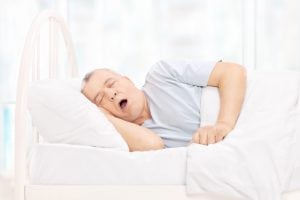When is it Time to Be Tested for Sleep Apnea?

In this blog, the sleep apnea specialist at eos dental sleep will explain when it’s time to be tested for sleep apnea and what is involved with getting tested.
Why do I need a sleep test?
Sleep testing is the only way to reliably diagnose sleep apnea. You may use your symptoms to confirm your suspicions that you should get tested, but you can't self-diagnose, particularly because there are so many different causes of sleep apnea.
Sleep apnea can be difficult to diagnose as most of the symptoms occur when you are asleep. A sleep test will help diagnose the condition by testing body functions such as breathing rate and oxygen levels while you sleep.
What are the symptoms of sleep apnea?
Not only does sleep apnea result in symptoms like snoring and dry mouth, but it also has a host of other possible side effects such as:
- Headaches
- Daytime drowsiness
- Inability to concentrate
- The nagging feeling that you have not been sleeping as much as you think you have
- Exhaustion
- Moodiness and irritability
- Brain fog
- Elevated blood pressure
When you have sleep apnea, you stop breathing in your sleep because something has blocked your airway. As a result, the brain signals to the body to wake up so that you can start breathing properly again. However, this blockage can recur over and over throughout the course of the night, resulting in continual awakenings. In some cases, you may have a partial blockage instead of a complete blockage. While this is better than a complete airway blockage, it can still lead to reduced oxygen intake and a lot of snoring, which significantly interferes with sleep quality.
If left untreated, sleep apnea symptoms can escalate to much more serious health complications, which includes an increased risk of cardiovascular disease, heart attack, and stroke, just to name a few.
Why is sleep testing necessary and when should I go?
If you have experienced any of the symptoms listed above, your doctor will most likely recommend that you be tested for sleep apnea. Testing can confirm or rule out whether your symptoms are due to sleep apnea or other possible conditions. In addition, sleep apnea testing is the first step to getting proper treatment for your sleep problems.
If your symptoms have become chronic and are interfering with your quality of life, it is time to undergo sleep testing. Years ago, you used to have to go to a clinic for sleep testing, but now, you can perform the test in the convenience of your own home with a kit that a sleep specialist will give you. People tend to sleep better in their own beds, so the results are usually more accurate.
You will take the test overnight, and then give the kit back to the sleep specialist and wait for your results. If you are diagnosed with sleep apnea, your sleep specialist will explain your treatment options and next steps.
When you think it's time to be tested, eos dental sleep is ready to help you. Our sleep specialist offers a non-invasive treatment for sleep apnea called oral appliance therapy, which can help you get the rest you deserve. Contact us to set up an appointment.
